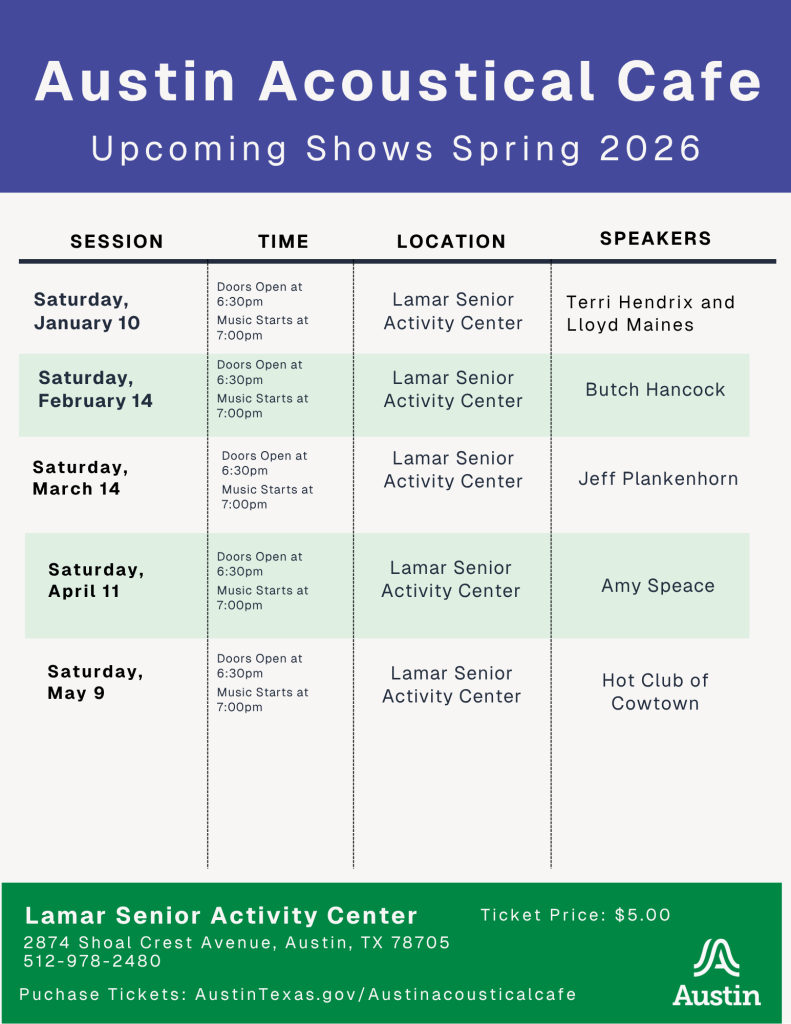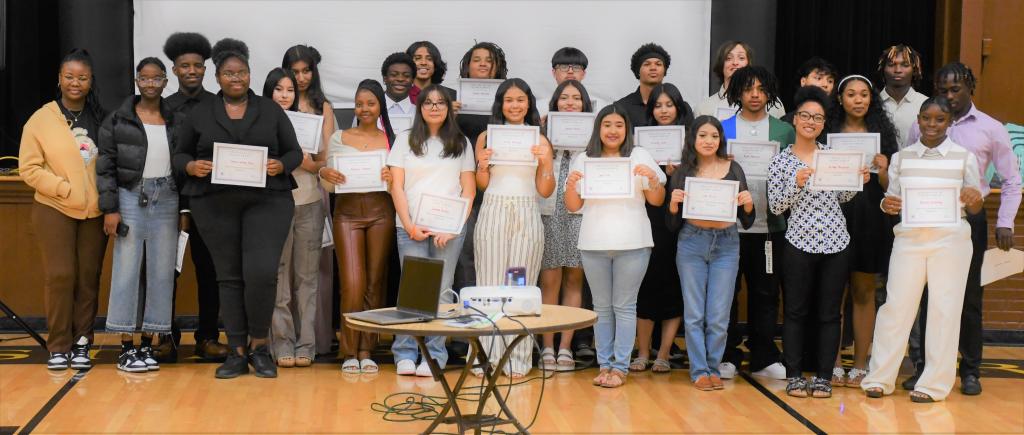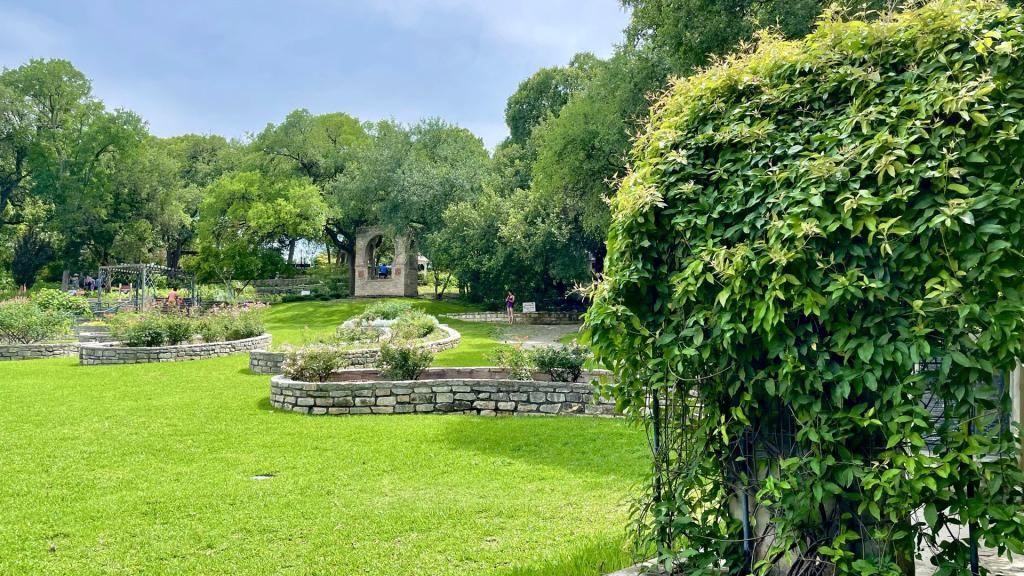
Programs
The Aquatic Division operates 45 public aquatic facilities, which includes 7 Regional pools, 3 Community pools, 22 Neighborhood pools, 1 Wading pool, Barton Springs Pool and 11 splash pads.
Athletics organizes adult recreational leagues for men, women and co-ed teams. Athletics reserves the Krieg and Havins softball complexes. Athletics partners with non-profit Youth Sport Organizations to provide recreational opportunities to Austin youth. Athletics collaborates with Recreation Centers to set standards for Youth Sports leagues.
Welcome to Austin's Truest Listening Room!
This music series is hosted monthly from October thru May at the Lamar Senior Activity Center, 2874 Shoal Crest Ave, Austin, TX 78705. 
Austin Parks and Recreation partners, or PARKners, bridge the gap between public funding and what our parks deserve. Public funding for parks comes from the City of Austin’s General Fund, which also covers 10 other departments. Austin Parks and Recreation’s limited budget goes further when we team up with PARKners. In turn, PARKners accomplish more in Austin parks when they collaborate with Austin Parks and Recreation to maximize opportunities and resources.
Austin's New Year is the City of Austin's Official New Year's Eve Celebration.
The City of Austin Cemetery Operations is a division of the Parks and Recreation and operates five municipal cemeteries and maintains two family cemeteries: Austin Memorial Park Cemetery, Evergreen Cemetery, Oakwood Cemetery, Oakwood Annex Cemetery, and Plummers Cemetery. The family cemeteries include the cemetery at Longview Park and the Stanley-Nolen Cemetery at Garrison Park.
Cemetery Operations is located at Austin Memorial Park and the staff manages the grounds, administrative operations, burials, and historic resources.
The Department has a permit process, fees, and requirements for regularly scheduled activities that enhance the park experience at select sites. Permits are required for all trainers/activities regardless if per fee classes are charged or not to a consumer.
Activities covered allowed under this process include:
- health and fitness consultants,
- dog trainers, yoga instructors,
- bicycle tour groups (non-motorized), and
- other outdoor professional service providers.
Austin Parks and Recreation is currently not accepting new Community Activated Park Project proposals.
The Community Activated Park Project (CAPP) program streamlines the process for proposing improvements to Austin parks. Neighbors, community groups, and partners can propose an improvement project by completing a CAPP form.
The Community Gardens Program helps groups start new gardens on parkland and provides support for existing community gardens on city owned land. Nonprofit program partners such as Austin Parks Foundation and Fruitful Commons also provide vital support through grants, volunteer coordination, and liability insurance.

Las Calaveras at Muertos Mercado at Republic Square. Photo courtesy of Downtown Austin Alliance
The Parks and Recreation Department offers a wide variety of programs for youth and teens, adults and 50+ seniors at our Community Recreation Centers. Youth programs include camps, sports, art clubs, teen events, toddler sports, and youth sports hosted year round. Adult and senior classes include anything from arts and crafts and aerobics to pickleball, citywide events, and field trips. Recreation Centers provide a comprehensive menu of activities and events for all ages and abilities to come together, connect with each other and create community through various experiences.
The Community Recreation Centers are proud to offer year-round co-ed youth sports that teach fundamentals and stress sportspersonship. Our seasonal leagues provide a safe recreational setting structured for a beginner to intermediate player. Lead by volunteer coaches, games are noncompetitive in order to emphasize teamwork and physical fitness. Developmental skills are taught in an energetic, positive and safe environment where players learn to respect the sport.
The City of Austin Parks and Recreation Department welcomes Meals on Wheels and More as our partner for the delivery of congregate meals to eight (8) recreation/neighborhood and senior activity centers through out Austin. The Senior Congregate Meals Program is open to anyone 60 years of age or older. The meals are at the suggested Client Share donation of $1.00 to $3.00 but no contribution is required.
Austin Parks and Recreation Department utilizes independent contract instructors to provide unique programming services at its recreational facilities. A contract gives you the ability to have your programs/activities based on the needs and space availability at our Facilities or Parks.
Austin City Code requires dogs to be on a leash in public areas, unless designated otherwise by City Code. Austin Parks and Recreation provides several off-leash areas (PDF) for you to enjoy with your dog. Generally, parks are open for public use each day from 5 a.m. to 10 p.m. unless otherwise posted. Access can be limited or affected by events or maintenance issues.
National Golf Foundation Study
Austin Parks & Recreation contracted the National Golf Foundation to conduct a study of the City of Austin’s Golf System. The NGF was charged with the following 1) review the City’s golf operations 2) submit recommendations to improve efficiency of operations, and 3) make a determination on the future market potential of its golf facilities. The NGF report has now been completed and the full report will be posted shortly, please check back.

The Health Promotions Unit is committed to providing lifelong recreational, cultural and educational opportunities to promote healthy lifestyles and environments which create a sustainable and livable community. The Health Promotions Unit supports active, healthy living by offering free programs to the Austin community.
Austin Parks and Recreation's Historic Preservation and Tourism Program (HPT) leads the restoration, stewardship, interpretation and promotion of the irreplaceable historic and cultural resources of Austin’s park system allowing visitors and residents to discover and experience an authentic connection to the city’s diverse history.
Austin Parks and Recreation is proud to provide a variety of free and low-cost programs for youth and teens. We strive to create positive, meaningful experiences for all of Austin’s youth through access to quality programs. We understand that many barriers exist to participation, such as access to transportation and program fees. Our goal is to reduce these barriers through intentional programs, equitable policies, and dedicated funding aimed at ensuring all youth & teens have the opportunity to join our programs and be successful.
The Austin Parks & Recreation memorial bench program was paused in 2021 to reassess processes and align with department priorities.
As of 2023, new memorial benches are installed only at City-managed cemeteries. The list of cemetery sites is available on the Cemeteries website. APR will continue to maintain existing benches in parks.
Contact Us:
Austin PARD contracted the NGF to conduct a study of the City of Austin’s Golf System. The NGF was charged with the following 1) review the City’s golf operations 2) submit recommendations to improve efficiency of operations, and 3) make a determination on the future market potential of its golf facilities. The NGF report has been completed is now available, please click here for the report.
Austin’s preserve system began in 1935 with the creation of Zilker Nature Preserve. Over the years, the City of Austin has acquired over 2513 acres of preserve land. Preserve land is a unique type of park land that is set aside because it provides essential endangered species habitat, includes a unique natural feature such as a cave or stream, or provides a prime example of a specific type of ecosystem. Preserve land is set aside by either purchasing property from private or commercial land owners, if an area is designated as endangered species habitat or if it is deeded to the city.
Audio Wild seeks to provide nature preserve visitors with compelling stories that provide a deeper sense of place through an auditory experience tailored to the site. Audio Wild is a work in progress and new recordings will be added as they are completed. Audio Wild recordings may provide the listener with a variety of experiences including unique insights into the natural history of the site, interesting facts about plants or animals in the area, or stories recounting the history of the site. Click an audio file link below to hear more.
The Chapel is a visitor center where we can, as an act of remembrance, learn about our cultural heritage through the people who were buried in the surrounding cemetery. Genealogy reveals our forebears' influence on the past and future. We share and collect individual narratives to create a framework for the collective human story.
A Park Operations and Maintenance Agreement, or POMA, is an agreement between the City of Austin and an eligible partner that gives the partner rights and responsibilities to operate, maintain, and program specific parkland. Only organizations that meet Austin Parks and Recreation’s strict Partnership A criteria are eligible for a POMA. For more information on Partnership A, see the Partnership Configurations section of the Austin PARKnerships website.
The City of Austin Park Ranger are ambassadors Austin parks who promote responsible recreation.
Parkland Dedication is a local government requirement imposed on subdivision and site plan applications mandating the dedication of land for a park and/or the payment of a fee to be used by the governmental entity to acquire land and/or develop park facilities.
Austin Parks and Recreation is grateful to have tens of thousands of volunteers each year who donate their time and energy to stewardship of our parks. Parkland stewardship is any form of enhancing and caring for parks—cleaning up trash, mulching trees, planting, removing invasive plant species, maintaining park infrastructure, restoring watersheds, and more.
The purpose of the Parks Prescription Program is to increase the number of healthcare providers that prescribe time in nature at parks. Spending time in nature has shown to improve physical and mental wellness and help prevent and manage chronic conditions. The program is a free intervention that uses parks to positively influence health outcomes
The Office of Special Events coordinates picnic and facility reservations, large special events/festivals, temporary concessions and commercial filming/photography requests within the Austin Parks and Recreation system.
Pickleball is a paddle sport created for all ages and skill levels. The rules are simple and the game is easy for beginners to learn, but can develop into a quick, fast-paced, competitive game for experienced players. It's a game for everyone!
Prescribed fire is a tool that land managers across the world have used for decades to restore habitat, improve rangeland health, improve forest health, reduce wildfire risk, and protect water supplies. In Austin parks and preserves, land managers use prescribed fire to restore native plant communities and reduce wildfire risk. Ecosystems in the Austin area developed over thousands of years with natural fires occurring periodically. As a result, many local plant communities thrive when fire is applied under very strict conditions.
The Parks and Recreation Department (PARD) values sustainability and resiliency and works hard to maintain our park spaces clean and inviting for Austinites and our visitors. We aim to minimize waste generation through source reduction, recycling or composting in order to both reduce the amount of waste sent to the landfill, as well as reduce costs for disposal of trash. Our goal is to ensure that our parks and facilities are compliant with
Empowering the Next Generation of Leaders! Our Roving Leaders program helps teenagers develop life and leadership skills as well as explore challenging topics they face every day. We give students the power to make a difference and improve their lives and communities by providing resources to help young people understand how their environment and habits are connected. We teach problem solving and critical thinking skills. Our philosophy is to improve the lives of teenagers in Austin by offering a range of high-quality recreational, educational, and cultural activities.
Senior Transportation Program operated by the City of Austin Parks and Recreation (PARD), Centralized Programs Division, Senior Programs. PARD has operated the Senior Transportation Program for over 30 years through the City of Austin general fund and grant funding provided by the Capital Area Council of Governments (CAPCOG). Goal: To provide a special system of transportation to enhance the quality of life and promote independence for persons 60 years or older residing within Austin city limits
The Austin Parks and Recreation Department offers a variety of Varsity Generation programs and services for people 50 years of age and older. Activities include traveling, pursuing old hobbies and learning new ones, socializing with friends, meeting new people, increasing knowledge, becoming and staying physically fit, supplementing income, contributing to the community and much more!
In 2017, the Parks and Recreation Department (PARD) completed an assessment of park system signage with recommendations for improvement, including the need for a programmatic approach to managing signage. In 2018, PARD harnessed internal graphic design resources to develop a concept-level update to PARD’s Signage and Wayfinding Manual with a focus on welcoming messaging and a refreshed look, but additional resources were still needed for the full development of a manual.
Austin Parks and Recreation has 25 soccer fields, 70 multipurpose fields and a growing number of mini-pitches. Adult and youth soccer leagues are available through community partner organizations. In the fall and spring, several Community Recreation Centers offer co-ed youth recreational soccer opportunities that teach the fundamentals of the game and encourage teamwork.

Austin Parks and Recreation provides accessible, diverse, and inclusive summer camps, and now offers early registration for community participants who qualify for financial aid. There are camps for youth (ages 5 to 12) and for teens (ages 12 to 15) at select locations.
The Summer Playgrounds Program seeks to foster healthy living, character building, and teamwork through collaborative and active play. With intentional programming developed specifically for youth ages 5 to 12, the Summer Playgrounds Program creates a space for youth to engage in a variety of activities that provides opportunities for them to learn and develop skills that can help them be successful.

The Austin Parks and Recreation Department is committed to offering programs for teens that encourage development through active play, outdoor exploration, the arts, critical thinking, and leadership activities. Teen Recreation programs offer participants a way to interact and create friendships with other teens around the city.
Teens in Leadership Training
Teens in Leadership Training (TILT) is a leadership and job readiness program for students 15-18 years of age. It gives teens the necessary skills and knowledge to be successful employees with the Austin Parks and Recreation Department (APR), other city departments, or with our community partners.

The purpose of the municipal tennis centers is to offer year-round tennis play and supervised tennis activities to the community through comprehensive programs for all ages.

Austin Parks and Recreation Department is proud to offer Therapeutic Recreation Services to provide safe, accessible, fun and supportive recreation environments for all persons no matter their abilities. Therapeutic Recreation Services include both adaptive and inclusive programs which are facilitated and supported by Certified Therapeutic Recreation Specialists (CTRS).
Totally Cool, Totally Art (TCTA) is a free after school art program that takes place in 12 recreation centers throughout Austin. While providing teens, grades 7th-12th, a chance to discover the wonders of self-expression through a multitude of mediums.
Austin’s urban forest provides millions of dollars annually in social, economic, and environmental benefits to the community and enhances the quality of life for Austin residents. Our community's tree resource is an integral part of what makes Austin one of the most attractive cities in the country. As the city continues to grow and develop the urban forest remains an integral part of the Austin landscape, quietly performing as one of our most invaluable community members and infrastructure components.
Wildlife Austin promotes the creation and conservation of wildlife habitats through community-wide collaboration and public education, and helps bridge existing city initiatives that encourage a well balanced and healthy urban environment for people and wildlife. Austin has a long track record of being dedicated to preserving and enhancing our environment. All of us have an important role to play! We all can make a profound contribution to keep Austin wild!
The City of Austin Parks and Recreation Department (PARD) is fortunate to have volunteers who execute youth sports programs on behalf of the City.
The Zilker Holiday Tree stands 155 feet tall and is composed of 39 streamers, each holding 81 multicolored led bulbs - totaling 3,309 lights. A double star at the top of the tree measures 10 feet from point to point with 150 frosted bulbs. The unique spiral pattern of lights was created by City of Austin electricians. At its circumference, the tree measures 380 feet. The diameter is 120 feet. The base of the tree is made up of 19 utility poles, each 14 feet tall, arranged in a circle around the Moonlight Tower.
The Zilker Metropolitan Tour is a virtual guide that offers highlights of spots around the park. Some of these points of interest are well-known and some you may have not even known existed. You are invited to enjoy this guide as you explore the park or in preparation of your journey.

.jpg)

.png)
